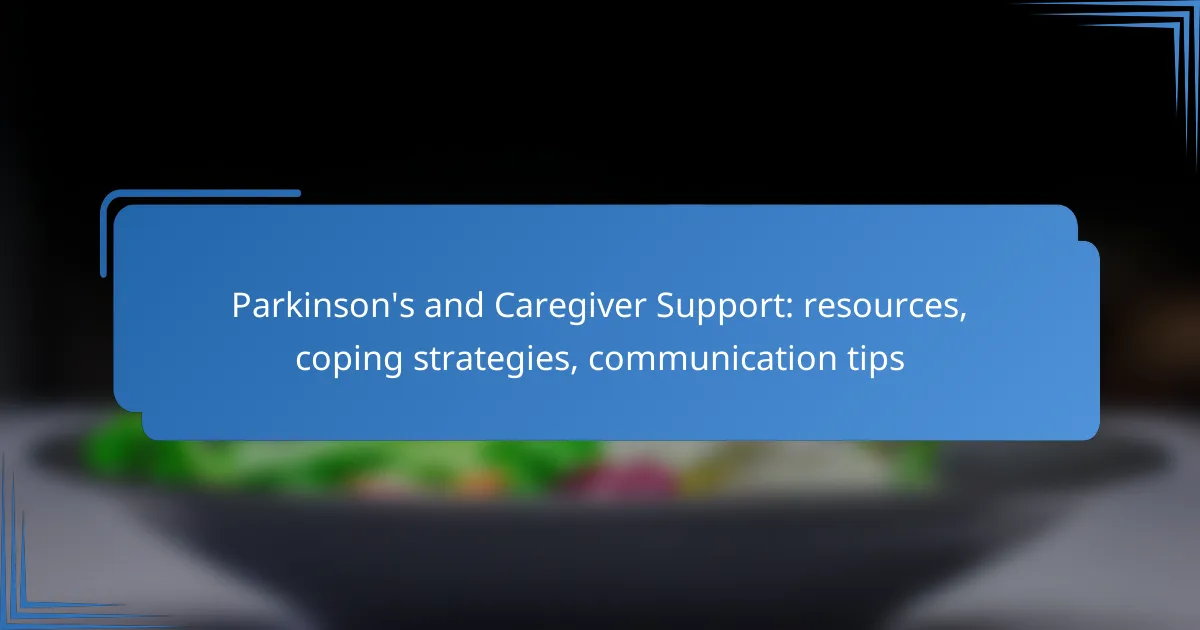Caregivers of individuals with Parkinson’s disease play a crucial role in providing support and maintaining quality of life. Accessing resources such as support services, educational workshops, and community initiatives can empower caregivers to navigate the challenges they face. Additionally, employing effective coping strategies and communication techniques can enhance their well-being and foster stronger relationships with those they care for.

What resources are available for Parkinson’s caregivers in New Zealand?
Caregivers of individuals with Parkinson’s in New Zealand can access a variety of resources designed to provide support, education, and community connection. These resources include dedicated support services, government programs, online forums, local health initiatives, and educational workshops tailored to the needs of caregivers.
Parkinson’s New Zealand support services
Parkinson’s New Zealand offers a range of support services specifically for caregivers. These include one-on-one counseling, support groups, and information resources that help caregivers understand the disease and its progression. Caregivers can also access helplines for immediate assistance and guidance.
Additionally, local branches of Parkinson’s New Zealand often host events and workshops that foster community engagement and provide practical advice for managing caregiving challenges.
Government-funded caregiver programs
The New Zealand government provides several programs aimed at supporting caregivers of individuals with Parkinson’s. These programs may include financial assistance, respite care services, and training opportunities to enhance caregiving skills. Eligibility for these programs often depends on the caregiver’s circumstances and the needs of the person they care for.
Caregivers are encouraged to explore options such as the Carer Support Subsidy, which can help cover the costs associated with caregiving, allowing for more flexibility and relief.
Online support groups and forums
Online support groups and forums are valuable resources for Parkinson’s caregivers in New Zealand. These platforms allow caregivers to connect with others facing similar challenges, share experiences, and exchange practical tips. Websites like the Parkinson’s New Zealand forum and social media groups provide a space for discussion and support.
Participating in these online communities can help reduce feelings of isolation and provide emotional support, which is crucial for maintaining caregiver well-being.
Local community health initiatives
Many local health organizations in New Zealand run initiatives aimed at supporting caregivers of those with Parkinson’s. These initiatives may include health workshops, exercise programs, and social activities designed to promote well-being and resilience among caregivers.
Engaging in local community activities can also help caregivers build a support network, making it easier to share resources and experiences with others in similar situations.
Educational materials and workshops
Educational materials and workshops are essential for equipping caregivers with the knowledge they need to provide effective support. Parkinson’s New Zealand offers various resources, including brochures, online articles, and seminars focused on caregiving strategies and self-care techniques.
Caregivers should take advantage of these educational opportunities to stay informed about the latest research and best practices in managing Parkinson’s disease, which can ultimately enhance their caregiving experience.

How can caregivers cope with the challenges of Parkinson’s?
Caregivers can cope with the challenges of Parkinson’s by employing effective strategies that address stress, time management, self-care, and respite care options. Understanding and implementing these techniques can significantly improve the caregiver’s well-being and ability to provide support.
Stress management techniques
Stress management is crucial for caregivers dealing with the demands of Parkinson’s care. Techniques such as mindfulness meditation, deep breathing exercises, and progressive muscle relaxation can help reduce anxiety and promote emotional resilience.
Setting aside time for hobbies or activities that bring joy can also serve as an effective stress reliever. Engaging in regular physical activity, such as walking or yoga, can further enhance mood and reduce stress levels.
Time management strategies
Effective time management helps caregivers balance their responsibilities while ensuring they do not become overwhelmed. Creating a daily schedule that includes specific time slots for caregiving tasks, personal time, and breaks can enhance productivity and reduce feelings of being rushed.
Utilizing tools like calendars or task management apps can help keep track of appointments and medication schedules, ensuring that nothing is overlooked. Prioritizing tasks based on urgency and importance can also help manage time effectively.
Self-care practices
Self-care is essential for caregivers to maintain their physical and mental health. Regularly engaging in activities that promote relaxation, such as reading, taking baths, or spending time in nature, can rejuvenate caregivers and prevent burnout.
Establishing a support network, whether through friends, family, or support groups, allows caregivers to share experiences and receive emotional support. This social connection is vital for maintaining a positive outlook and coping with challenges.
Accessing respite care options
Respite care provides temporary relief for caregivers, allowing them to take breaks while ensuring their loved ones receive quality care. Options for respite care may include in-home care services, adult day programs, or short-term stays at assisted living facilities.
Researching local resources, such as community centers or Parkinson’s support organizations, can help identify available respite care options. Many regions offer financial assistance programs to help cover the costs of respite care, making it more accessible for families in need.

What communication tips can help caregivers and patients?
Effective communication is vital for caregivers and patients with Parkinson’s disease. Utilizing specific strategies can enhance understanding and strengthen relationships, making daily interactions smoother and more supportive.
Effective listening techniques
Active listening is crucial for caregivers when communicating with patients. This involves giving full attention, maintaining eye contact, and acknowledging feelings through nods or verbal affirmations. Caregivers should avoid interrupting and instead allow the patient to express themselves fully.
Summarizing what the patient has said can also reinforce understanding. For example, repeating back key points helps clarify any misunderstandings and shows the patient that their thoughts are valued.
Using assistive communication devices
Assistive communication devices can significantly aid patients with Parkinson’s who may struggle with speech. Tools like speech-generating devices or apps can facilitate clearer communication. Caregivers should explore options that best fit the patient’s needs and preferences.
Additionally, simple tools like notebooks or whiteboards can be effective for jotting down thoughts or messages. These devices can help bridge communication gaps, especially in more challenging situations.
Non-verbal communication strategies
Non-verbal cues play a significant role in communication for both caregivers and patients. Facial expressions, gestures, and body language can convey emotions and intentions when words may be difficult. Caregivers should be mindful of their own non-verbal signals, as they can impact the patient’s comfort level.
Using visual aids, such as pictures or symbols, can also enhance understanding. This approach can be particularly helpful in conveying complex ideas or emotions without relying solely on verbal communication.
Encouraging open dialogue
Creating an environment that encourages open dialogue is essential for effective communication. Caregivers should foster a safe space where patients feel comfortable sharing their thoughts and feelings. This can be achieved by asking open-ended questions and showing genuine interest in the patient’s experiences.
Regular check-ins can also promote ongoing communication. Setting aside time for discussions about daily challenges or feelings can help caregivers stay informed and responsive to the patient’s needs.

What are the best products for Parkinson’s caregiver support?
The best products for Parkinson’s caregiver support include adaptive tools, mobility aids, and medication management systems designed to enhance the quality of care and improve daily living for both caregivers and patients. These products can significantly ease the challenges faced in caregiving, making tasks more manageable and promoting independence for those with Parkinson’s.
Adaptive tools for daily living
Adaptive tools are essential for helping individuals with Parkinson’s perform daily tasks more easily. Items such as weighted utensils, non-slip mats, and easy-grip handles can enhance the ability to eat, cook, and manage personal hygiene. Consider tools like jar openers or dressing aids that simplify these activities.
When selecting adaptive tools, look for those that are specifically designed for individuals with limited dexterity or tremors. Products that are lightweight and ergonomically designed can reduce strain on both the caregiver and the person receiving care.
Mobility aids and devices
Mobility aids are crucial for ensuring safety and independence for individuals with Parkinson’s. Walkers, canes, and rollators can provide the necessary support while moving around the home or outdoors. It’s important to choose mobility devices that are adjustable and suited to the user’s height and strength.
In addition to traditional mobility aids, consider using grab bars in bathrooms and stairlifts for multi-level homes. These modifications can significantly reduce the risk of falls, which are a common concern for those with Parkinson’s.
Medication management systems
Effective medication management is vital for individuals with Parkinson’s, as it often involves multiple prescriptions. Medication organizers, pill dispensers, and reminder apps can help ensure that doses are taken correctly and on time. Look for systems that provide visual or auditory reminders, which can be particularly helpful.
When implementing a medication management system, consider the ease of use for both the caregiver and the individual. Systems that allow for easy refills and tracking can help maintain adherence to the prescribed regimen, ultimately improving health outcomes.
